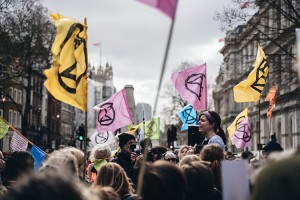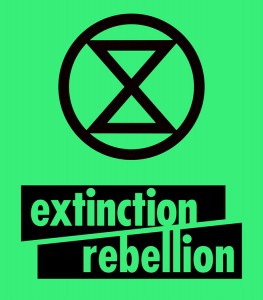The Extinction Rebellion
August 16, 2019
Throughout 2019, a controversial movement known as the Extinction Rebellion has been making headlines around the world. The Extinction Rebellion is an international movement that advocates nonviolent civil disobedience (see the detailed explanation below) to pressure governments into taking action on climate change and the mass extinction of animal species. The movement, spurred by the negative effects of global warming and habitat loss, began in the United Kingdom in 2018, and it has since spread to Australia, Canada, France, Ireland, New Zealand, Norway, Spain, the United States, and other countries. The stated goal of the group is to preserve Earth for all living things.

Extinction Rebellion activists gather before the prime minister’s office in London, England, on March 9, 2019. Credit: © Sandor Szmutko, Shutterstock
In its own words, the Extinction Rebellion (sometimes referred to as XR) is attempting “to halt mass extinction and minimize the risk of social collapse.” The group wants governments to work to halt biodiversity loss and reduce greenhouse gas emissions. The WWF (formerly the World Wildlife Fund) reports that animal populations have decreased by 58 percent in the last 50 years, mainly due to habitat loss. The widespread loss of animals has a corresponding detrimental effect on human populations. And carbon dioxide and other greenhouse gases produced by the burning of fossil fuels are the leading causes of global warming. The XR also asks individual citizens to lead healthier and environmentally responsible lives.
The Extinction Rebellion began in October 2018, when climate activists gathered for a “Declaration of Rebellion” in London’s Parliament Square. The movement quickly grew and spread to other parts of the world where existing climate action groups gathered under the circled hourglass extinction symbol banner. Major Extinction Rebellion protests have blocked bridges, roads, and public transportation, and they have disrupted government, media, and petroleum company offices. Because their actions are often unlawful, the group is somewhat controversial, and many XR activists have been arrested.
Civil disobedience is the deliberate and public refusal to obey a law. Some people use civil disobedience as a form of protest to attract attention to what they consider unjust or unconstitutional laws or policies. They hope their actions will move other people to correct the injustices. Other people regard civil disobedience as a matter of individual religious or moral conviction. They refuse to obey laws that they believe violate their personal principles.
Throughout history, there has been widespread disagreement concerning the use of civil disobedience in a society based on law and order. Some people claim that citizens are obligated to disobey laws they consider unjust, for example laws segregating the races. They say that such lawbreaking may be the best way to test the constitutionality of a law. Some defend the use of civil disobedience by pointing to laws widely considered unjust or immoral, such as Nazi Germany’s laws calling for extermination of Jews and other groups. Other people claim that it is never right to break a law deliberately. They argue that defiance of any law leads to contempt for other laws. Any act of civil disobedience, they believe, weakens society and may lead to violence and anarchy (the absence of government or law).
Famous practitioners of civil disobedience include the writer Henry David Thoreau, the suffragist Susan B. Anthony, and Mohandas K. Gandhi of India. In the United States, during the 1950′s and 1960′s, Martin Luther King, Jr., and other civil rights workers deliberately violated Southern segregation laws as a means of fighting racial injustice. Many opponents of the Vietnam War (1957-1975) committed various illegal acts in attempts to change U.S. policy. Some refused to pay their taxes. Others refused to register for the draft. During the 1980′s, nonviolent protests were directed at the repressive racial policy of apartheid (segregation) of the minority white government in South Africa.



